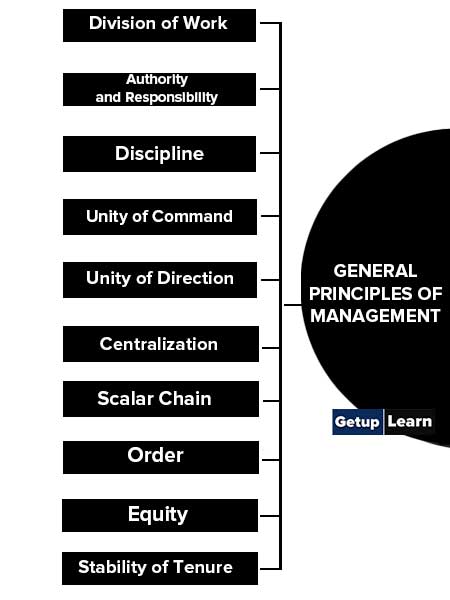
Table of Contents
General Principles of Management
Principles of Management are fundamental truths and they establish a cause-effect relationship. Henri Fayol has listed fourteen principles of management. Fayol emphasized two important aspects with regard to his principles.
- The list of principles is only suggestive and not exhaustive and only those principles which he used on most occasions had been discussed.
- These principles are flexible and not rigid and they can be adapted to every need and situation provided one knows how to make use of them.
The fourteen general principles of management are as follows:
- Division of Work
- Authority and Responsibility
- Discipline
- Unity of Command
- Unity of Direction
- Subordination to General Interest
- Remuneration of Personnel
- Centralization
- Scalar Chain
- Order
- Equity
- Stability of Tenure
- Initiative
- Esprit de Corps

Division of Work
In order to take advantage of specialization, this concept of division of work was formulated. Specialization leads to efficiency and accuracy which increases output. Fayol applied this principle to both managerial as well as technical work. The principle of division of work can be applied to all levels of the organization.
Henri Fayol points out that these two terms ‘authority’ and responsibility are related to one another and they go hand in hand. Responsibility is a corollary to the former and arises from it.
There should be parity of authority and responsibility, in order to discharge responsibility properly. According to Fayol, authority is derived from one’s position, whereas personal authority is derived from personal qualities like experience, intelligence, etc.
Discipline
Discipline is “respect for agreements which are directed to achieving obedience, application, energy and outward marks of respect”. Discipline is essential for the smooth functioning of an enterprise and it should prevail at all levels of an organization.
Discipline can be enforced through good supervision, fair and clear agreements, and judicious sanction of penalties.
Unity of Command
This principle is based on the concept of “one man – one Boss” Every individual in an organization should receive instructions and orders from only one superior. If a person receives instructions from two or more superiors, then it would lead to unnecessary conflict and delay.
For the effective functioning of an organization, unity of command is essential. But for the unity of command, authority is undermined, orders are disturbed and stability is threatened.
Unity of Direction
According to this principle, each group of activities having the same objective must have one head and one plan. Unity of direction and unity of command is not the same.
Where the latter pertains to the functioning of persons, the former is concerned with the functioning of the body corporate directed towards the achievement of common goals. Unity of direction leads to unity of action and coordination of efforts.
Subordination to General Interest
When there is a conflict between individual interest and general interest, individual interest should be subordinated to the general interest. The interest of the organization is above individual interest.
Factors like ambition, weakness, selfishness, etc., may reduce the importance of general interest. Constant supervision, fair agreement, and firmness on the part of the superiors help in the subordination of individuals to the general interest.
Remuneration of Personnel
Fair remuneration and maximum possible satisfaction to both employees and employers, were advocated by Henri Fayol. In large-scale organizations, he favored non-financial incentives. He favored a profit-sharing plan for managers and not for workers.
Centralization
Without using the term centralization of authority. Fayol refers to the extent to which authority is centralized or decentralized. Centralization and decentralization are only a question of proportion.
According to Henri Fayol, the size of the firm and the individual circumstances will determine the degree of Centralisation.
Scalar Chain
The scalar chain of authority refers to the flow of communication ranging from the highest to the lowest level. All upward and downward communication should flow through each position in the line of authority which he should clear.
The chain of command can be short-circuited only in special circumstances when it is absolutely essential. For this purpose, Henri Fayol has suggested the concept of ‘Gang plank’ wherein two subordinates can deal directly with each other, provided they inform their immediate superior of any action taken by them.
Order
This principle relates to two aspects to order, namely social order and material order. In the social order, there should be the right person in the right place, and in the material order, there should be a place for everything and everything should be in its place.
Order in an organization helps to establish a constant balance between human requirements and resources.
Equity
Equity refers to the combination of justice, fairness, and kindness. Equity of treatment brings about loyalty in the organization. The concept of equity should be applied at all levels in the organization.
Stability of Tenure
According to this principle, there should be reasonable security of jobs. Workers should not be removed within a short period. Stability of tenure is required to get a worker accustomed to his new job and help him to perform better in the future.
Unnecessary labor turnover affects the organization to a great extent and is a cause of bad management. Fayol suggested stability of tenure for all and more so for managerial personnel.
Initiative
Fayol advocated that managers should encourage their employees for taking initiative. It is concerned with the power of thinking out a plan and ensuring its successful implementation. It adds to the energy and zeal of human beings.
Esprit de Corps
This is a French term that means “union is strength”. It refers to the spirit of loyalty and devotion which integrates the members of a group.
Unity can be obtained in an organization, through proper coordination of work, smooth social relationships among the workforce, and by creating enthusiasm among the workers to contribute to their maximum possible extent.
What are the 14 general principles of management?
The following are the general principles of management:
1. Division of Work
2. Authority and Responsibility
3. Discipline
4. Unity of Command
5. Unity of Direction
6. Subordination to General Interest
7. Remuneration of Personnel
8. Centralization
9. Scalar Chain
10. Order
11. Equity
12. Stability of Tenure
13. Initiative
14. Esprit de Corps.
